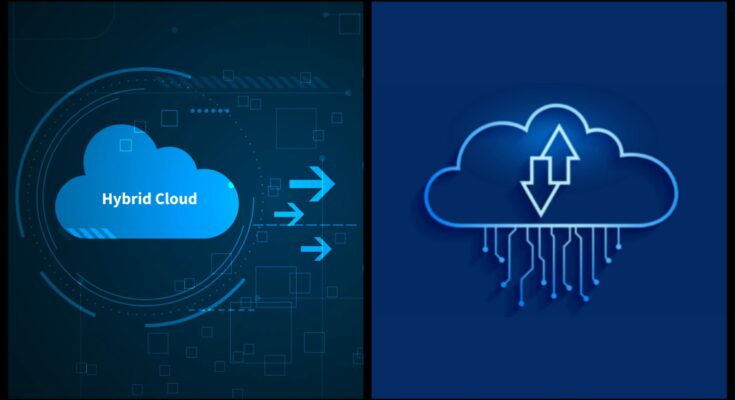Your business could be transformed by hybrid cloud.
The astonishing achievements of cloud computing technology and the way it has altered the entire course of data storage and management are the greatest achievements that information technology has seen thus far. Hybrid cloud can transform your business. Additionally, businesses and enterprises now have access to computing services like servers, databases, analytics, and more thanks to the cloud.
Since the third-party service provider manages the Public Cloud, an error or blackout would render the entire organization powerless and prevent it from accessing applications and data.
Even though an organization can tailor the infrastructure and setup of Private Cloud to meet their specific requirements, managing the entire datacenter without encountering any technical difficulties is a significant undertaking.
Why Hybrid Cloud, then? How does it affect a company’s transformation? How can a Hybrid Cloud infrastructure model benefit an organized business? That concludes our discussion of the issues at hand.
Scalability Scaling on-premises infrastructure for expanding businesses is costly and necessitates extremely precise growth projections to achieve cost-effective scaling. As a result, businesses can take advantage of Hybrid Cloud’s unlimited on-demand resources. Important to note is that 24% of large companies have reduced their operational costs as a direct result of hybrid cloud’s on-demand scalability and its sheer prowess, according to a report by International Data Group (IDG).
Furthermore, we are able to align our entire architecture to meet the performance requirements that were previously met only by dedicated servers. So a venture can explore through the responsibilities by satisfactory versatile organization frameworks.
Profoundly secure
It might represent a significant danger to the whole association on the off chance that the information and characterized data are at the gamble of being presented to unapproved clients. An organization can have dedicated servers and network devices that can restrict access, minimizing the possibility of a security breach because the hybrid cloud is neither entirely private, limiting the timely support of external data centers, nor entirely public, putting resources in the hands of third-party vendors like Amazon Web Services or Azure.
You only pay for what you use, even though cloud computing is available to everyone. For what reason would it be a good idea for us to need to take care of the bill for registering administrations that we never again need? Yes, reputable hardware systems are the only ones capable of handling certain enterprise workloads. However, a company needs to be adaptable enough to accommodate varying traffic and speed up time to market. Therefore, with hybrid cloud, we can rent the substantial increase while owning the base configuration, allowing the business to pay only for the services they use.
Management of disasters: Can we even begin to imagine what it would be like if a disaster struck and all of our data were at risk of being lost forever? The hybrid cloud makes it simple to use the backup sites and applications that protect data from outside forces. On-premises datacenters are established solely to prevent these types of data breaches; however, an enterprise can benefit from a cost-effective and flexible hybrid cloud environment.
The recovery model that is provided by the hybrid cloud is highly trustworthy, and data recovery can be completed quickly and easily.
Simply put, cloud bursting is a configuration setting that enables businesses to manage workloads in the face of an unprecedented rise in IT demands. For instance, if a company with Private Cloud infrastructure runs out of resources, the excess workload is sent to the cloud that is immediately available.
But because hybrid cloud uses both public and private clouds to handle large tasks, an organization can easily handle them even when dealing with a lot of very hard work.
Freedom in data management There may be highly classified data or information that we are reluctant to share with third-party service providers due to the possibility that doing so would necessitate putting a company’s security and privacy at risk. However, due to the workload sometimes being too large for a private cloud to accommodate, it is inevitable that an expanding collection of data and applications will necessitate and force an organization to share the data center.
Therefore, the hybrid cloud enables businesses to have complete control over sensitive data, which should be privatized. For instance, if a banking industry wishes to operate in a hybrid cloud environment, hypersensitive data, such as account holders’ private bank statements or crucial information about the account’s nature, can be restricted to the bank itself. However, the public cloud can also be used to store less sensitive data that does not pose a real threat to the account holder or the bank.
Best performance It is unquestionably the sole objective of any business or organization to increase productivity without sacrificing application or product quality. In addition, that particular product ought to be introduced to the market and used within a short period of time. The hybrid cloud responds with a great deal of clarity and fecundity to these fundamental aspects.
Hybrid cloud considers the potential advantages of both public cloud and private cloud. An organization may reach a glorified stage where its strengths are revealed to be insurmountable when the strengths of these two clouds are combined to form the powerful environment where a lot of workloads are lofted with ease.







